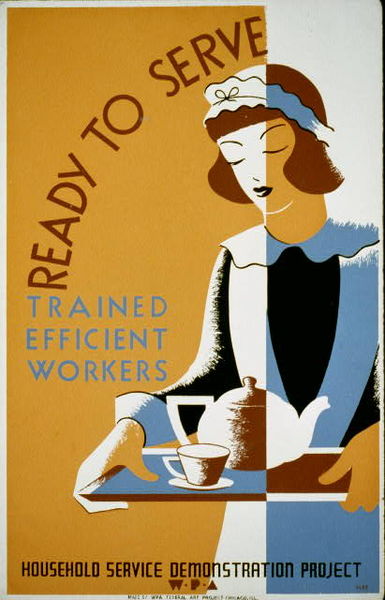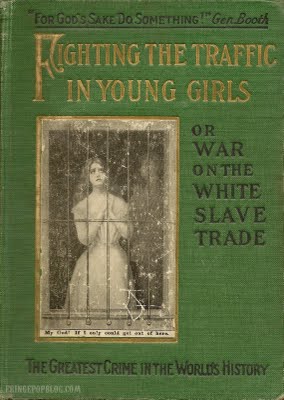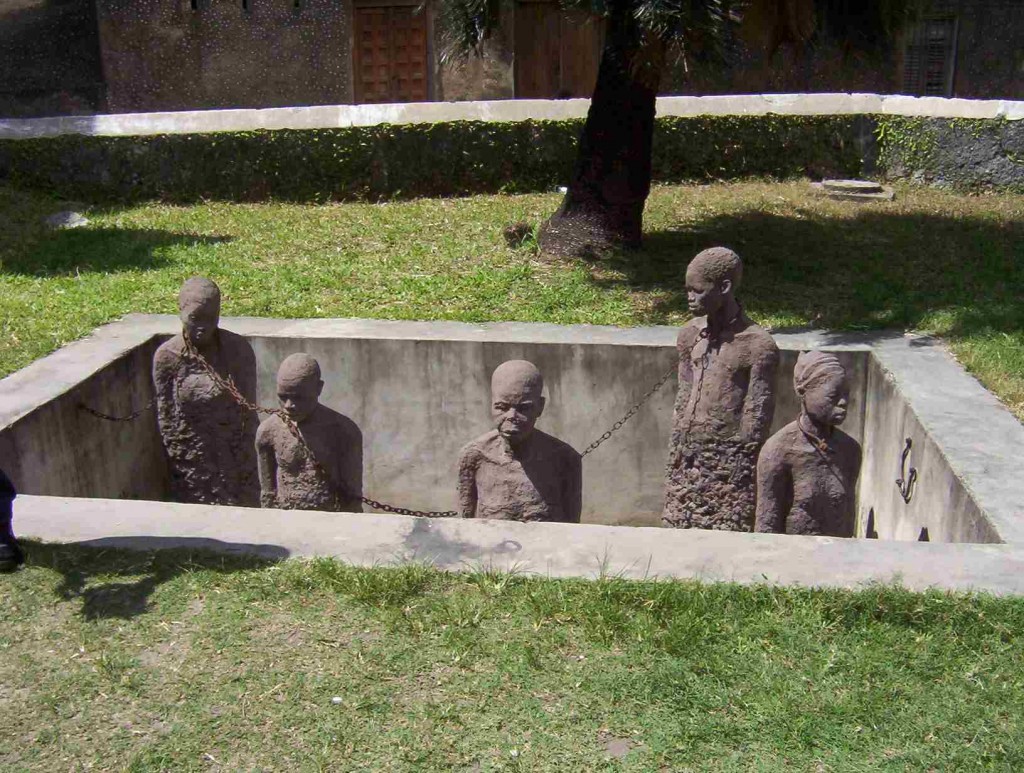Liberalism is often thought to be a panacea for righting historical wrongs, and using condemnations of past behavior as moral leverage to limit current freedoms for the greater good of the society as a whole. Much of our present thinking on what Sam Huntington termed ”The Clash of Civilizatons” is based on the us and them premise is based on these underpinnings of western liberal democratic thinking. But what if this foundation is grounded in the inherent contradictions in liberal democratic thought; smug assurances that the West holds the moral trump card when referring to basic premises about human nature and behavior. Almost one hundred and fifty years after Mill the West , sated with ethical indigestion, still fails to recognize cultural differences in a meaningful way or worse, recognizes them in a way that falls into racist hands. if problems of human slavery and trafficking exist today, the tendency to demonize the symptom and neglect the cause seems to prolong the activity.
( Martha )Nussbaum’s work on (John Stuart ) Mill tends to accentuate the positive, and she scarcely addresses those critics of Mill who worry that he is an unlikely hero for anti-hierarchical thinking, given his colonialist entanglements. But if she does not directly address the charges of Mill’s ethnocentrism, colonialism, imperialism, racism, etc., Anthony Kwame Appiah, her seeming ally in the new cosmopolitanism, does, and in very sharp terms. Mill is in fact the main protagonist of Appiah’s subtle work on The Ethics of Identity, a book that moves gracefully between a breathtaking range of positions. But on one point, Appiah is quite uncompromising: against the charge, which he takes as common to Uday Mehta, Bhikhu Parikh and John Gray, that ‘Mill was an autonomist, and that autonomism is an ethnocentric preference, ruled out by pluralism’, he argues that the critics have it backwards. Thus, ’In fact, Mill is truly ethnocentric precisely where he suspends the requirement of autonomy. . .. The Mill who says that even the despotism of an Akbar or a Charlemagne can be beneficial for backward societies cannot be accused of foisting an ethic of autonomy upon cultures for whom autonomy is not a value. It is not the smallest of ironies that these critics of Mill accept his arguments at their weakest – and reject them at their strongest’ ”
…”Salt was profitable, gold was more profitable still, but no commodity was more abundant and profitable than slaves, and slavery was always a mainstay of Saharan commerce….Eyewitness reports of slave caravans across the desert left many a grisly portrait. Dozens of them remark on the unnerving silence of the passing throng: the grumbling of camels, and the plodding of human feet, but never the crack of whips, never screams from the victims or curses from the slavers. There had been no need for whips, for the poor benighted slaves knew that laggardliness meant certain death. If one stumbled and fell, the other slaves would try to support him, or the slave masters would cut off his head and there would be an open neckband in the chain, a horrid reminder to the weary.”

- ” The expatriation and subsequent feelings of mass displacement experienced by this group of people is a defining aspect of modern history, encompassing essentially both the First and Third Worlds. It is ironic that the Africans and Americans, who as two distinct groups of people, were once quite literally worlds apart, are today separated by merely a hyphen! ”
The Arabs had the answer to the world’s economic problem. Yet it was a long time before they got the slave trade properly organized. First, they had to conquer by fire and sword hundreds of thousands of square miles in one of the most amazing campaigns of all time, not excluding Alexander’s conquest of Asia Minor. For the Arab armies started their invasion of North Africa and southern Europe from Egypt, which entailed crossing the greatest desert on earth from east to west, a march of nearly two thousand miles….
John Stuart Mill is often cast as grotesquely Eurocentric, complacently and arrogantly imperialistic, and politely racist, arbitrarily confining his liberalism to home turf. The charges are not always made together,but more often than not they are; works suggesting that Mill’s ethnocentric, Eurocentric, and colonialist or imperialist predilections amounted to racist tendencies. For some, Mill’s admiration for his father’s History of British India and his own work with the East India Company are deeply suggestive of his complicity in the growth of the British empire and in justifications for that growth grounded on racial difference.

''Today reports from the US capitol stated that Malaysia is back on the human trafficking blacklist. Again. To get a better idea of just how bad and humiliating this is for Malaysia, take a look at who else is on the list. Malaysia is right up there with the African nations of Chad, Eritrea, Niger, Mauritania, Swaziland, Zimbabwe, Sudan and “developed” nations, Saudi Arabia and Kuwait. Other human trafficking buddies include Cuba, Fiji, Iran, Myanmar, North Korea, Papua New Guinea and Syria. No offense intended to all of these nations, but they are not the most peaceful and advanced nations in the world are they? ',
”As Uday Mehta put it, in his influential work, Liberalism and Empire: In India. . . especially following the mutiny of 1857, there was in fact an unmistakable tilt toward the hardening of authoritarian policies and a racializing of political and social attitudes. This was a tilt to which thinkers like J.S. Mill added their prestige and that they justified in their theoretical writings. For example, in Considerations on Representative Government, Mill had made clear that in colonies that were not of Britain’s ‘blood and lineage’ any move toward greater representation was not to be countenanced.” It is almost as if the Arab slave trade in the Sahara was used as a template by the British in India and for colonialism in general; just given a subtle manipulation and a more eclectic veneer couched in hypocrisy of a higher order, which would confirm Karen Armstrong’s assertion that the present Islamic/Western tensions are purely based on political considerations beyond the jingoistic moral flag-waving.
Mehta suggests that the younger Mill was a ‘surprising exception’ to the generalization that at this historical juncture ‘race is seldom deployed as an explicit political category in the writings by British liberals’. Rather, Mill invests race with far greater seriousness than most of his liberal contemporaries, who generally view it as a catchall term that loosely designates what might be called cultural difference. Instead Mill elaborates the term through the biological notion of ‘blood.’ Hence for example in the Considerations on Representative Government he draws what he takes to be the crucial distinction in terms of readiness for representative institutions by reference to ‘those of our blood’ and those not of our blood.
…It is not surprising then, that it took them almost a hundred years to wipe out the last vestiges of Byzantine authority in the coastal cities, in addition to the Berber resistance in the desert and mountains. Overpowering the Christians was relatively easy; they collapsed almost at the sight of ten thousand Arab horsemen under their pennants and banners, but the Berbers were a different matter. When Arabs and Berbers joined in battle, it was axiomatic that they fought until one side or the other was wiped out to the last man.
But the Arabs had one advantage over all other armies of conquest. Their religion made dying on the field of battle a relatively easy form of martyrdom, since it assured the warrior a passport into the most delightful heaven men had so far conceive
he posthumous rewards for Christian martyrdom, in contrast, were debatable. One is amazed at a young mother like Saint Perpetua of Carthage willingly leaving her new baby and electing to be tossed by a savage cow into eternity. The Mohammedans had far livlier prospects, whence it follows that no religion has served the cause of war so well as Islam.
Moreover, the Arabs had an additional advantage. They were almost pitiless in their dealings with their enemies and devised some very fancy and elaborate tortures, punishments,, and insults for those who fell into their hands. We read of a Berber chieftain, though badly wounded, being flayed alive, his skin stuffed with straw, and the dummy thrown into a cage for two monkeys to play with. Whether the punishment firs the crime for enemies of Allah is also debatable. It is not surprising then,that the Arab commanders and governors could put to death all their prisoners in cold blood and thus save themselves the problem of what to do with them. In fact, they often enjoyed doing the job themselves.

- ”Arab slave traders as opposed to European traders preferred to carry out raiding sorties, often travelling far into Africa. Their other distinction was that their markets back home preferred to buy female slaves as opposed to male. This was because there was a stronger demand for household maids as well as sexual slaves rather than slaves to work on farms.”
The Emir Ibrahim, after his victory at Tripoli in 894, sat on his throne, had his prisoners led before him, and personally plunged his spear into their hearts. The admiring Arab historian al-Nuwayri reports that Ibrahim killed five hundred defenseless men in this manner before he grew tired of the sport.
These were the people then, who took over North Africa and the desert from the Romans and ended by imposing their religion, customs and language on almost the entire northern half of the African continent. These, too, were the people who had no interest whatsoever in the wefare of the nations they had conquered except to force their religion on them by the sword. Otherwise, the conquered territories were simply sources of loot.
…” For Mehta, Mill and the whole lot of classical utilitarians were as wanting in humility as they were overbrimming with fatuity:
The almost pathological extent to which Bentham made precision the guiding ambition of his science of legislation; the confidence with which James Mill could extol the virtue of ‘A Code’ for India even if it required an ‘absolute government’; the certainty with which J.S. Mill knew that ‘there is nothing for [backward people] but implicit obedience to an Akbar or a Charlemagne’ – by the nineteenth century these political impulses become verities of liberalism when faced with the unfamiliar. They are the intellectual precursors of Francis Fukuyama’s confident projections regarding the ‘end of history’ and the attitude that typically views regimes like those in Cuba and Iran as being in some provisional interregnum. The unlikely hero of Mehta’s book turns out to be Edmund Burke, the last holdout of a humbler form of liberal pluralism before the fanatical onslaught of utilitarian confidencemen (never mind that Burke himself was anti-Semitic).

''The media today loves a good story about a white woman in peril. Whether it be the kidnapping of a little white girl or the murder of a middle-class white mother, the media makes sure we know about it. It shouldn't be too surprising that turn-of-the-century books fixated on the white woman's peril as well. They too didn't care much for the plight of minorities or minority women, and in fact, by using the word "white slave trade," they explicitly exclude non-whites from their concerns.''
…The loot of Africa was twofold: slaves and ivory. One in a sense presupposing the other, since slave porters were obviously needed to bring the ivory out of the Congo. The routes by which both ”products” were brought from Lake Chad to the Mediterranean ports had, of course, already been well traveled even in Carthaginian times. The Arab traders simply took over these trans-Saharan trails and went into business. Before their day was over they were estimate to be bringing out 5,000 slaves a year by the Fezzan route alone, losing half of them on the way. By 1900 the Lake Chad region from which these African slaves were taken was practically depopulated.
In the pursuit of the slave trade, the Arabs had the same advantage of religion and ferocity as they had enjoyed in war. Their attitude was extremely simple. ”Allah has created them slaves as he had made their skins black, and you can change the one as little as the other,” said the Sheik of the Kwaida tribe, who could trace his descent from the earliest Mohammedan conquerors. He further argued that Allah had created black men to be sold and had given the Arabs the special right to sell them. ”Neither the fact that the Negroes of his old hunting grounds were fast becoming Mohammedans, and as such by the laws of the Koran ceased to be lawful spoil, nor the damage done to the Negro countries by the continual raids, reconciled him to the new conditions. He was a true and pious Mohammedan, and his alms attracted many poor to his village…”
”No one knows the number of hapless captives who stumbled along the Saharan caravan routes from the African savanna to the slaving warehouses of the north. Their numbers were certainly in the many hundreds of thousands, and perhaps millions. In the eighteenth century, Arab caravans brought as many as five thousand slaves annually from the Sudan to Tripoli alone; slaving raids deep into the savanna “cleaned out” entire villages and, typically, returned with ten or fifteen thousand captives. For much of the last millennium the slave trade dominated all commerce, even gold, for there seemed an inexhaustible hunger for slaves all through the Maghreb, the Levant, and Arabia; and slaves from central Africa were even forced to walk across central Asia to Tashkent and Bukhara in the days of Tamerlane the Magnificent, in the fourteenth century. Black slaves were found all over the Hellenic and Roman worlds; and for centuries after the Arab conquest of North Africa there were flourishing slave markets in dozens of desert towns, with “warehouses” in places like Sijilmasa, In-’Salah, Ghadamès, and Zouila. Until well into the nineteenth century perhaps half the value of all Saharan traffic was in slaves.” ( www.ralphmag.org)
The greatest traveled of the main routes was from Lake Chad to Tripoli. The slave caravans that crossed the Sahara by this route were enormous, consisting of thousands of camels and thousands of slaves, for the Arab traders traveled together when they could as much for the sake of pleasure as of security. As far as the slave trader’s personal safety was concerned, he had nothing to fear but the hostility of the tribes whose country he was crossing. Neither was he in any danger of dying of thirst since he knew the whereabouts of every well. It was the slaves marching across the desert who had to worry about water, and it was this very concern of the Africans that enabled the Arab slavers to herd their caravans across the desert with a minimum of trouble.
”Mehta’s line is presented as in some respects a more forceful variant of the arguments of Bhikhu Parekh and John Gray, to the effect
that comprehensive Millian liberalism failed badly on the count of sensitivity to culture difference and receptiveness to genuine pluralism. Just as the Calvinists were depicted in On Liberty as fundamentally out of sync with the progressive tendencies of civilization, so too the Indians, the black Jamaicans, the Irish, and others were in the rearguard of history, not the vanguard, and might need stern discipline. Come to that, as Mill admitted in his Autobiography, he was in the later decades of his life not all that confident that the English were fit for democracy. Still, the English, even if they were Calvinists, did not bear the burden of different ‘blood’.”
…The Arab guards had only to indicate the direction of the next well, or water hole, and the slaves would trudge in that direction. The system was to feed and water the Africans at the well, point out the road and landmarks to the next, and send the column on its way. The only difficulty was getting the slaves to leave the well and plod off once again into the desert. This was accomplished by blows and curses, but, in general, there was very little resistance at any stage of the journey.

David Theo Goldberg, in his important essay ‘Liberalism’s Limits: Carlyle and Mill on “The Negro Question” ’, has put the point with maximal severity:Mill’s argument for benevolent despotism failed to appreciate that neither colonialism nor despotism is ever benevolent. Benevolence here is the commitment to seek the happiness of others. But the mission of colonialism is exploitation and domination of the colonized generally, and Europeanization at least of those among the colonized whose class position makes it possible economically and educationally. And the mandate of despotism, its conceptual logic, is to assume absolute power to achieve the ruler’s self-interested ends. Thus colonial despotism could achieve the happiness of colonized Others only by imposing the measure of Europeanized marks of happiness upon the other, which is to say, to force the other to be less so.
Mill’s argument necessarily assumed superiority of the despotic, benevolent or not; it presupposed that the mark of progress is (to be) defined by those taking themselves to be superior; and it presumes that the ruled will want to be like the rulers even as the former lack the cultural capital (ever?) quite to rise to the task. Mill’s ambivalence over the inherent inferiority of ‘native Negroes’, even as he marked the transformation in the terms of racial definition historically from the inescapable determinism of blood and brain size to the marginally escapable reach of cultural determination, has resonated to this day in liberal ambivalence regarding racial matters.















 COMMENTS
COMMENTS



